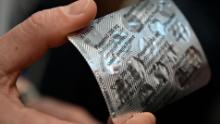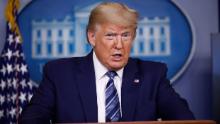President Trump is wrong in so many ways about hydroxychloroquine studies. Here are the facts
[ad_1]
Clinical trials are considered the gold standard in medicine. Boiled down to the essentials, clinical trials take a large group of people, give half of them the drug and half of them a placebo, and see how each group fares.
The half that takes the placebo is called the control group. The reason to have a control group is that it allows the doctors to tell if it’s the drug itself that is having an effect on the study subjects, and not something else. If the drug group and the placebo group have the same results, then it’s likely the drug did not have an effect.
Over the past few weeks, Trump has made several erroneous statements relating to hydroxychloroquine studies. Here are basic questions about these studies with answers from the president and then answers from doctors.
Question #1: How soon until we know if hydroxychloroquine works against coronavirus?
Trump says "days.”
Doctors say weeks or months.
Azithromycin is an antibiotic better known as Zithromax or a Z-pack.
Of the 15 US research centers, only a few are studying hydroxychloroquine and azithromycin in combination; most are studying just hydroxychloroquine.
CNN reached out to the 15 centers to ask how long it would take them to get results. Seven centers either did not respond or said they didn’t know.
The reason a clinical trial can’t be done in days is because the universities need to recruit study subjects, who then need to take the pills for a period of time. Doctors need to analyze the results.
That all takes time — even when doctors are moving at lightning speed because of the pandemic.
"We need rigorous science, we need the right science,” said Dr. Ruanne Barnabas, the principal investigator at the University of Washington. "This is the most urgent study we’ve ever worked on and we’re moving quickly to get results.”
Question #2: French researchers have already done a clinical study showing hydroxychloroquine works as a treatment for coronavirus. Doesn’t that tell us something?
Trump says yes.
Doctors say the study was terrible, so no.
"You’ve seen the same test that I have,” he said. "In France, they have a very good test.”
There are several concerns about the paper, including that it ignored patients who took the drug and fared poorly.
Question #3: Have some people tried to delay hydroxychloroquine clinical trials?
Trump says yes, and he came to the rescue.
Doctors say they have no idea what he’s talking about.
Trump has said some unnamed force has been trying to keep hydroxychloroquine research in the lab and he’s had to swoop in and fight to move it forward into human studies.
Trump offered no proof that anyone was encouraging that hydroxychloroquine be tested in a lab, much less for "a couple of years.”
The infectious disease experts interviewed for this story, told CNN they don’t know of anyone who advocated for hydroxychloroquine research to be slowed down — in fact, they were planning their hydroxychloroquine trials before Trump ever mentioned the drug.
Dr. David Boulware, who’s running the University of Minnesota trial, says he started planning his study ten days before that, on March 9.
In days, Boulware accomplished what he says usually takes more than a year to do.
"For clinical trials, this has by far been the fastest of my career,” he said. "I think it’s broken world records.”
Question #4: Is hydroxychloroquine safe for coronavirus patients?
Trump says yes.
Doctors say the drug can have serious side effects.
Trump makes it sound like hydroxychloroquine is harmless.
The label for Plaquenil, a brand of hydroxychloroquine, says patients taking the drug have reported "life threatening and fatal” cardiac problems and "irreversible” vision problems.
CNN’s Brynn Gingras, Marshall Cohen, Casey Hicks, John, Lizzie Jury, and Michael Besozzi contributed to this report
[ad_2]
Source link
Health News Updates by Focus News






